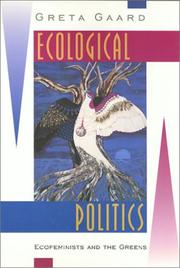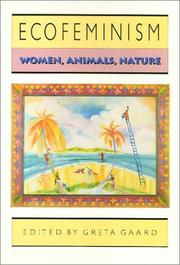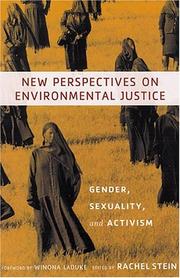| Listing 1 - 9 of 9 |
Sort by
|
Book
ISBN: 9781498533584 9781498533591 9781498533607 1498533582 1498533604 Year: 2017 Publisher: Lanham, Md Lexington Books
Abstract | Keywords | Export | Availability | Bookmark
 Loading...
Loading...Choose an application
- Reference Manager
- EndNote
- RefWorks (Direct export to RefWorks)
Australian feminist philosopher Val Plumwood coined the term "critical ecofeminism" to "situate humans in ecological terms and non-humans in ethical terms," for "the two tasks are interconnected, and cannot be addressed properly in isolation from each other." Variously using the terms "critical ecological feminism," "critical anti-dualist ecological feminism," and "critical ecofeminism," Plumwood's work developed amid a range of perspectives describing feminist intersections with ecopolitical issues-i.e., toxic production and toxic wastes, indigenous sovereignty, global economic justice, species justice, colonialism and dominant masculinity. Well over a decade before the emergence of posthumanist theory and the new materialisms, Plumwood's critical ecofeminist framework articulates an implicit posthumanism and respect for the animacy of all earthothers, exposing the linkages among diverse forms of oppression, and providing a theoretical basis for further activist coalitions and interdisciplinary scholarship. Had Plumwood lived another ten years, she might have described her work as "Anthropocene Ecofeminism," "Critical Material Ecofeminism," "Posthumanist Anticolonial Ecofeminism"-all of these inflections are present in her work. Here, Critical Ecofeminism advances upon Plumwood's intellectual, activist, and scholarly work by exploring its implications for a range of contemporary perspectives and issues--critical animal studies, plant studies, sustainability studies, environmental justice, climate change and climate justice, masculinities and sexualities. With the insights available through a critical ecofeminism, these diverse eco-justice perspectives become more robust.
Ecofeminism. --- Ecofeminism --- Climate change --- Theory --- Book

ISBN: 1566395690 1566395704 Year: 1997 Publisher: Philadelphia (Pa.): Temple university press
Abstract | Keywords | Export | Availability | Bookmark
 Loading...
Loading...Choose an application
- Reference Manager
- EndNote
- RefWorks (Direct export to RefWorks)
Ecofeminism --- Environmental ethics --- Environmental policy --- Green movement

ISBN: 0877229880 0877229899 Year: 1993 Publisher: Philadelphia Temple University Press
Abstract | Keywords | Export | Availability | Bookmark
 Loading...
Loading...Choose an application
- Reference Manager
- EndNote
- RefWorks (Direct export to RefWorks)
Book
ISBN: 1003201857 1000553019 1000553027 1003201857 1032063475 1032063491 Year: 2022 Publisher: Routledge
Abstract | Keywords | Export | Availability | Bookmark
 Loading...
Loading...Choose an application
- Reference Manager
- EndNote
- RefWorks (Direct export to RefWorks)
Book
ISBN: 9780415822602 0415822602 9780203520840 9781134079667 9781134079735 9781138934399 1138934399 1134079591 020352084X 1134079664 Year: 2013 Volume: 16 Publisher: London Routledge
Abstract | Keywords | Export | Availability | Bookmark
 Loading...
Loading...Choose an application
- Reference Manager
- EndNote
- RefWorks (Direct export to RefWorks)
Feminist literary criticism --- Ecocriticism --- Environmental literature --- History and criticism --- American literature --- Ecofeminism in literature --- Ecology in literature --- Feminism and literature --- Nature in literature --- Literary criticism, Feminist --- Feminist criticism --- Nature in poetry --- English literature --- Agrarians (Group of writers) --- Women authors&delete& --- Women authors --- Environmental literature - History and criticism

ISBN: 0252067088 0252023730 Year: 1998 Publisher: Urbana : University of Illinois Press,
Abstract | Keywords | Export | Availability | Bookmark
 Loading...
Loading...Choose an application
- Reference Manager
- EndNote
- RefWorks (Direct export to RefWorks)
American literature --- Ecology in literature. --- American literature --- American literature --- Feminism and literature --- Women and literature --- Human ecology in literature. --- Feminist literary criticism. --- Ecofeminism in literature. --- Nature in literature. --- Littérature américaine --- Ecologie dans la littérature --- Ecrits de femmes américains --- Littérature américaine --- Féminisme et littérature --- Femmes et littérature --- Ecologie humaine dans la littérature --- Critique féministe --- Ecoféminisme dans la littérature --- Nature dans la littérature --- Women authors --- History and criticism. --- Women authors --- History and criticism --- Theory, etc. --- Women authors --- Study and teaching. --- Femmes écrivains --- Histoire et critique --- Histoire et critique --- Théorie, etc --- Femmes écrivains --- Etude et enseignement


ISBN: 1283592037 9786613904485 0813542537 9780813542539 0813534267 9780813534268 0813534275 9780813534275 Year: 2004 Publisher: New Brunswick, NJ
Abstract | Keywords | Export | Availability | Bookmark
 Loading...
Loading...Choose an application
- Reference Manager
- EndNote
- RefWorks (Direct export to RefWorks)
Women make up the vast majority of activists and organizers of grassroots movements fighting against environmental ills that threaten poor and people of color communities. New Perspectives on Environmental Justice is the first collection of essays that pays tribute to the enormous contributions women have made in these endeavors. The writers offer varied examples of environmental justice issues such as children's environmental health campaigns, cancer research, AIDS/HIV activism, the Environmental Genome Project, and popular culture, among many others. Each one focuses on gender and sexuality as crucial factors in women's or gay men's activism and applies environmental justice principles to related struggles for sexual justice. The contributors represent a wide variety of activist and scholarly perspectives including law, environmental studies, sociology, political science, history, medical anthropology, American studies, English, African and African American studies, women's studies, and gay and lesbian studies, offering multiple vantage points on gender, sexuality, and activism. Feminist/womanist impulses shape and sustain environmental justice movements around the world, making an understanding of gender roles and differences crucial for the success of these efforts.
Women --- Women environmentalists. --- Environmental justice. --- Eco-justice --- Environmental justice movement --- Global environmental justice --- Environmental policy --- Environmentalism --- Social justice --- Environmentalists --- Women scientists --- Women in politics --- Political activity.


ISBN: 9780813542539 9780813534268 Year: 2004 Publisher: New Brunswick, N.J. Rutgers University Press
Abstract | Keywords | Export | Availability | Bookmark
 Loading...
Loading...Choose an application
- Reference Manager
- EndNote
- RefWorks (Direct export to RefWorks)
Digital

ISBN: 9780814760741 9780814762967 Year: 2016 Publisher: New York, N.Y. New York University Press
Abstract | Keywords | Export | Availability | Bookmark
 Loading...
Loading...Choose an application
- Reference Manager
- EndNote
- RefWorks (Direct export to RefWorks)
| Listing 1 - 9 of 9 |
Sort by
|

 Search
Search Feedback
Feedback About UniCat
About UniCat  Help
Help News
News